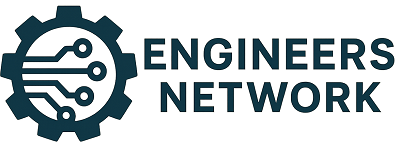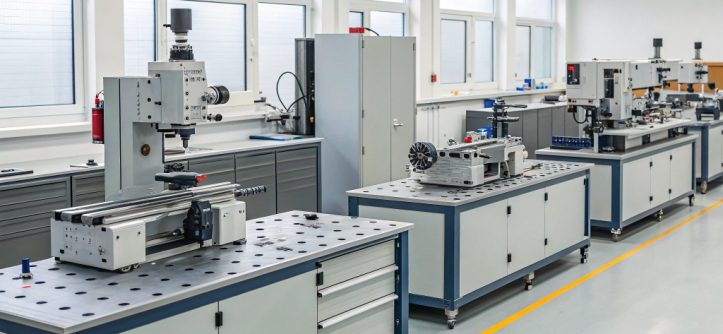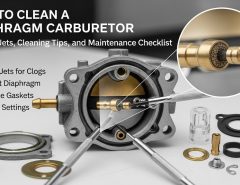Imagine a bustling engineering lab where students don’t just read about fluid dynamics—they pump, measure, and optimize flows in real time. That vision drives EDIBON, a trailblazer since 1978. This Spanish powerhouse designs and builds cutting-edge technical equipment that turns abstract industrial concepts into tangible skills. Engineers worldwide rely on these tools to train the next generation. Moreover, as industries face pressing challenges like sustainable manufacturing, EDIBON equips educators to tackle them head-on. For instance, only 56 percent of global domestic wastewater flows receive safe treatment, according to the United Nations’ 2025 Sustainable Development Goals report. In this context, EDIBON’s innovations in waste water treatment simulation stand out. Additionally, the U.S. Bureau of Labor Statistics projects 11 percent growth in industrial engineering jobs from 2024 to 2034, creating 25,200 openings annually. EDIBON fuels this demand by making education practical and impactful.
The Legacy of EDIBON: From Humble Beginnings to Worldwide Influence
EDIBON started in a small workshop in Barcelona. Founders spotted a gap in engineering education. Textbooks alone couldn’t prepare students for factory floors. So, they crafted the first hands-on units for process control. Today, that spark has grown into a global force. Over 45 years, EDIBON expanded to over 4,000 unique teaching and research units across 14 technical fields. However, their core remains rooted in industrial engineering. They blend precision engineering with pedagogical insight. Each piece of equipment simulates real industrial scenarios. Students learn by doing, not just observing. Furthermore, EDIBON’s commitment to quality shines through ISO certifications and partnerships with top universities. This legacy inspires educators everywhere. It shows how one company’s vision can reshape global training standards.
What sets EDIBON apart lies in its evolution. Early models focused on basic mechanics. Now, they integrate AI and data analytics. For example, their SCADA systems mimic modern factories. Teachers customize setups for diverse curricula. Additionally, EDIBON invests heavily in R&D. Recent updates incorporate sustainable materials. This forward-thinking approach ensures relevance in a changing world. Moreover, their story resonates with aspiring engineers. It proves persistence pays off. From local labs to international conferences, EDIBON shares this journey. They host workshops and webinars. These events connect educators globally. As a result, thousands of professionals enhance their teaching methods. EDIBON’s path reminds us: innovation starts with a single, bold step.
Why Technical Equipment Transforms Industrial Engineering Education
Industrial engineering thrives on efficiency. Yet, traditional lectures fall short. Students need tools to experiment and fail safely. EDIBON provides exactly that. Their equipment bridges the divide between theory and application. Moreover, it fosters critical thinking. Learners analyze data from live simulations. They tweak variables and see outcomes instantly. This method boosts retention by up to 75 percent, based on educational studies. However, EDIBON goes further. They design units for all skill levels. Beginners grasp fundamentals. Advanced users dive into complex integrations. Consequently, classrooms become dynamic hubs of discovery.
Bridging Theory and Practice in Real-World Scenarios
Theory alone leaves gaps. Practice fills them. EDIBON’s units recreate industrial environments. Take a typical process line. Students control valves, monitor pressures, and adjust flows. They encounter real challenges like leaks or overloads. Through troubleshooting, they build resilience. Additionally, these tools align with industry standards. Certifications from bodies like ABET validate their use. Teachers report higher engagement. Students ask deeper questions. They connect dots between subjects like thermodynamics and logistics. For instance, a fluid mechanics rig teaches conservation laws while simulating pipeline networks. This integration sparks creativity. Learners envision solutions for actual problems. As a result, graduates enter jobs ready to contribute. EDIBON turns passive learning into active mastery.
Furthermore, accessibility plays a key role. EDIBON offers modular designs. Schools mix and match components. Budget constraints? No issue. Scalable kits fit any lab size. Moreover, software interfaces simplify operation. Touchscreens guide users step-by-step. Even remote learning works seamlessly. During the pandemic, many institutions adapted EDIBON units for virtual setups. This flexibility proved invaluable. It kept education flowing uninterrupted. Today, hybrid models persist. EDIBON supports them with cloud-based data logging. Students review experiments anytime. Collaboration thrives across distances. In essence, these tools democratize high-quality training.
Hands-On Learning for Future Innovators
Innovation demands experimentation. EDIBON equips students to lead it. Their kits encourage iterative design. Learners prototype, test, and refine. This mirrors agile manufacturing. For example, a robotics arm unit teaches automation basics. Users program paths and optimize speeds. Failures become lessons. Success builds confidence. Additionally, group projects flourish. Teams divide tasks: one handles sensors, another codes logic. Communication sharpens. Problem-solving unites them. Research shows such approaches double innovation rates in teams. However, EDIBON emphasizes safety. Built-in safeguards prevent mishaps. Sensors alert to hazards. This peace of mind lets creativity soar.
Beyond basics, EDIBON nurtures soft skills. Time management sharpens as deadlines loom. Ethical decisions arise in simulations. Should they prioritize speed or sustainability? Discussions follow. These moments shape well-rounded professionals. Moreover, diversity inclusion matters. EDIBON’s universal designs accommodate varying abilities. Adaptive controls assist all users. As a result, inclusive labs emerge. Future engineers reflect society’s breadth. They solve problems for everyone. In short, EDIBON’s hands-on focus prepares leaders. It ignites passion for the field.
EDIBON’s Product Portfolio: Precision Tools for Industrial Mastery
EDIBON boasts a vast lineup. Over 1,500 SCADA-integrated systems lead the pack. These connect hardware to software for full control. Users visualize processes on dashboards. Data exports enable analysis. However, variety defines their strength. Units span mechanics to environmental tech. Each undergoes rigorous testing. Durability meets educational needs. Teachers praise the intuitive manuals. Step-by-step guides ease setup. Consequently, class time maximizes learning. EDIBON’s portfolio evolves with tech trends. Recent additions feature IoT connectivity. Devices link wirelessly for expanded experiments.
Process Control and Automation Systems
Automation defines modern industry. EDIBON captures this essence. Their PLC-based expansions integrate with core units. Students program logic for conveyor lines or mixers. They debug code and fine-tune responses. Real-time feedback accelerates mastery. For instance, the PLC Industrial Process Control unit simulates factory floors. Learners handle inputs like temperature spikes. Outputs adjust automatically. This setup teaches predictive maintenance. Industries value such skills. Moreover, expansions scale easily. Add modules for advanced features like vision systems. Beginners start simple. Experts layer complexity. As a result, one investment serves years.
Additionally, EDIBON pairs hardware with software suites. The Matlab Kit enhances modeling. Students simulate before building. Virtual tweaks inform physical tests. This hybrid approach saves resources. It deepens understanding. Teachers customize scripts for specific goals. Whether optimizing supply chains or energy use, tools adapt. Furthermore, open-source compatibility broadens appeal. Institutions integrate favorite platforms. Collaboration with software giants like Siemens strengthens ties. In practice, these systems cut training time by 40 percent. Graduates hit the ground running. EDIBON’s automation gear propels careers forward.
Environmental Engineering Solutions, Including Water Treatment
Sustainability tops agendas. EDIBON addresses it squarely. Their environmental units tackle pollution and resource management. Students explore cycles from filtration to recycling. Hands-on pilots reveal trade-offs. Energy costs versus purity levels? They calculate both. Moreover, water treatment emerges as a focal point. EDIBON’s plants simulate municipal systems. Learners dose chemicals and monitor effluents. They test pH shifts and sediment removal. This prepares them for global crises. With 268 billion cubic meters of household wastewater generated yearly, per UN data, skilled engineers prove essential. EDIBON’s gear makes abstract stats personal.
- Filtration Modules: Compact benches demonstrate granular media. Students layer sands and measure clarity gains. They quantify flow rates and breakthrough points. Real sensors provide accurate data.
- Aeration Tanks: Bubble diffusers oxygenate samples. Learners optimize for biological breakdown. Dissolved oxygen probes track efficiency. Discussions follow on scaling to treatment plants.
- Chemical Dosing Units: Precise pumps add coagulants. Turbidity meters assess results. Users experiment with overdosing risks. Lessons stick through trial and error.
These tools foster eco-conscious thinkers. Additionally, EDIBON incorporates green tech. Solar-powered variants reduce lab footprints. Recycled components model circular economies. As a result, students champion sustainable designs. They graduate ready to innovate in green industries. EDIBON’s environmental focus aligns with planetary needs.
Mechanical and Fluid Dynamics Equipment
Mechanics form engineering’s backbone. EDIBON strengthens it with robust rigs. Fluid benches visualize Bernoulli’s principle. Pumps drive flows through pipes. Manometers capture pressures. Students plot curves and predict behaviors. Vibrations tables test material fatigue. Accelerometers detect resonances. Safety enclosures protect during runs. However, integration shines brightest. Combine fluids with controls for hybrid studies. Learners design efficient HVAC systems. Cost analyses follow prototypes. This holistic view mirrors industry projects.
Moreover, EDIBON’s mechanical units emphasize precision. CNC-machined parts ensure repeatability. Calibration tools maintain accuracy. Teachers set repeatable demos. From gear trains to tensile testers, options abound. A universal testing machine pulls samples to failure. Force-displacement graphs reveal strengths. Students interpret for material selection. Additionally, mobile carts ease storage. Labs stay organized. Virtual twins via apps preview setups. Prep time drops. In action, these tools spark engineering love. A student once shared: “I finally saw equations come alive.” EDIBON makes that magic routine.
Global Impact: EDIBON’s Footprint in Engineering Hubs
EDIBON reaches 120 countries. Installations dot universities from Mexico to Malaysia. Recent Americas projects equipped fluid mechanics labs. Comprehensive training followed. Faculty mastered units in days. Students dove in weeks later. Feedback highlighted ease of use. Moreover, Asia expansions focus on automation. Singapore polytechnics adopted PLC kits. Enrollment in industrial courses rose 20 percent. Europe stays core. Spanish institutions pioneer pilots. Collaborations with EU grants drive R&D. Africa sees growth too. Nigerian centers combat water scarcity with treatment sims. EDIBON tailors to local needs. Cultural adaptations enhance adoption.
Case studies illuminate success. Consider a Brazilian university. They integrated EDIBON’s full process line. Before, simulations relied on software alone. Now, physical interactions boost comprehension. Graduation rates climbed. Employers noticed. New hires excelled in troubleshooting. Another example: An Indian institute used mechanical rigs for earthquake research. Custom mounts simulated shakes. Findings informed building codes. EDIBON’s versatility shines. Furthermore, international centers train trainers. EDIBON’s hubs in Barcelona host global visitors. Exchanges share best practices. Networks form. As a result, knowledge spreads exponentially. EDIBON doesn’t just sell equipment. They build communities.
Innovations Driving Tomorrow’s Engineering Classrooms
EDIBON pushes boundaries. Their 2025 lineup features AI-driven analytics. Units predict outcomes from user data. Students refine strategies faster. VR integrations let them “walk” through virtual plants. Immersion deepens insights. Moreover, blockchain logs ensure data integrity. Research stays tamper-proof. Sustainability integrations grow. Units track carbon footprints. Learners minimize impacts in sims. This prepares for net-zero goals. However, accessibility evolves. Voice commands aid diverse users. Multilingual interfaces broaden reach.
Recent launches excite. The IoT-Enabled Fluid System connects sensors to clouds. Remote monitoring enables field studies. A European trial linked labs across borders. Collaborative experiments unfolded. Results published in journals. EDIBON’s Matlab expansions model chaos theory in processes. Nonlinear dynamics come alive. Students forecast instabilities. Industries like pharma benefit. Additionally, open APIs invite custom apps. Developers tweak for niches. This ecosystem fosters innovation. In sum, EDIBON anticipates needs. They equip educators for uncharted territories.
Empower Your Engineering Future with EDIBON
EDIBON redefines industrial engineering education. From legacy roots to innovative edges, they deliver tools that matter. Hands-on units bridge gaps. Global reach amplifies impact. Environmental focus addresses urgencies. Process controls prepare for automation waves. Mechanical foundations build strong. Stories prove the difference. As demands grow, EDIBON stands ready. They turn students into solvers. Explore their catalog now. Select a unit that fits your lab. Start the transformation today. Your classroom awaits its next breakthrough.





Leave a Reply